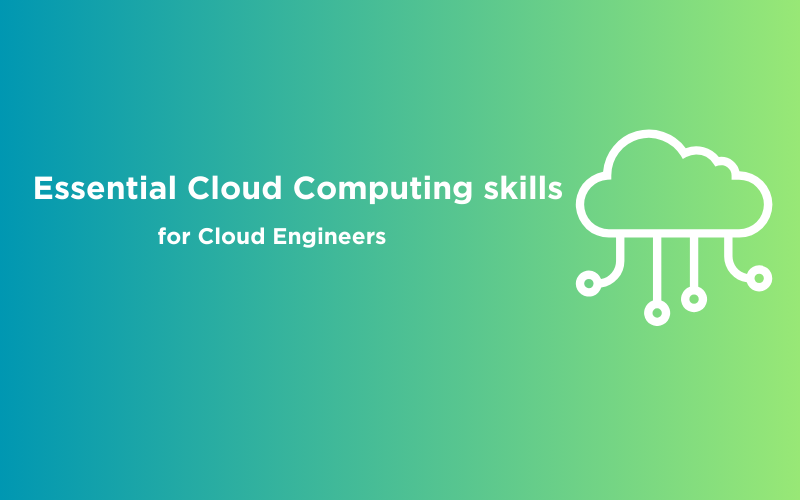
Essential Cloud Computing Skills for Cloud Engineers in 2025
Mar 06, 2025 4 Min Read 10989 Views
(Last Updated)
Cloud computing has become one of the most sought-after skills in the tech industry, ranking just after Machine Learning and Artificial Intelligence. Hence, the need for skilled cloud computing engineers who have mastered in-demand tools and have the relevant skills is constantly rising with lucrative salaries awaiting them.
But what exactly is cloud computing? And what are the essential cloud computing skills needed to bag one of these high-paying roles? Well, tag along because I will be answering both these questions and more in the in-depth guide!
Table of contents
- Understanding Cloud Computing
- Why Learn Cloud Computing?
- Essential Cloud Engineering Skills
- Proficiency in Programming Languages
- Understanding Software and Database Concepts
- Networking Skills
- Knowledge of Cloud Infrastructure
- Basic Knowledge of Hypervisor and Data Visualization
- Database Management Skills
- Core Technical Skills Required to Become a Cloud Engineer
- How to Improve Your Cloud Engineering Skills at Work?
- Conclusion
- What are the skills required for a cloud engineer fresher?
- Does a cloud engineer need coding skills?
- Can a beginner become a cloud engineer?
- Do cloud engineers need SQL?
- Can a non-IT person learn cloud computing?
Understanding Cloud Computing

Cloud computing refers to the virtual internal service provided by the cloud for the purpose of data storage. It enhances the security of organizations and enables data storage with minimal or basically no IT infrastructure.
I mean, we’ve all had storage problems right even for our little GBs, imagine the hassle for bigger organizations! And the cloud just makes it so much simpler and more efficient!
In simpler terms, cloud computing delivers computing services that encompass storage, databases, networks, and software analytics. There are different methods of conducting cloud computing, including public clouds, private clouds, hybrid clouds, and multi-clouds.
The biggest advantage of cloud computing is its ability to be customized based on the specific needs of a company. It offers adaptability to the cloud infrastructure that best suits the organization and your specific needs.
Before we move to the next part, you should have a deeper knowledge of cloud computing concepts. You can consider enrolling yourself in GUVI’s Cloud Computing Course, which lets you gain practical experience by developing real-world projects and covers technologies including Azure Command-Line Interface (CLI), Azure Monitor, Azure Resource Manager (ARM) Templates, and tools like Visual Studio Code, among many others.
Additionally, if you want to explore Azure through a Self Paced course, try GUVI’s Azure certification course.
Why Learn Cloud Computing?
Well, since you’re here reading this article, I’m pretty sure you’ve already made up your mind to build a career in cloud computing but I’d still like to take a few paras of your time and discuss what mastering this domain can entail for you.
Cloud computing is an important skill to learn, as the demand for cloud engineers is high, which we discussed in the intro itself. Major companies like IBM, Amazon, and Microsoft are actively recruiting cloud engineers, recognizing cloud computing as the future of technology.
Cloud computing offers several advantages that can benefit the future generation of computing. Its flexibility and scalability make it easier to access data where it is needed, increasing organizational productivity and it is truly very exciting to be working with the cloud!
By mastering cloud engineering skills, you can secure high-paying jobs and build a very successful IT career.
Essential Cloud Engineering Skills

Enough chit-chat about the whys, let’s move on to the hows and the whats of cloud computing skills. First, we will begin with the basic aspects that you must master to begin your learning journey as a cloud computing engineer.
The following skills are essential for cloud engineers to succeed:
1. Proficiency in Programming Languages
Cloud engineers should be proficient in at least one programming language. Programming skills are necessary for developing and maintaining cloud applications and infrastructure.
Cloud engineers must continuously upgrade their skills by learning programming languages like SQL, Python, Java, Ruby, .NET, PHP, and C++.
2. Understanding Software and Database Concepts

A strong understanding of software and database concepts is essential for cloud engineers. This knowledge enables them to design and implement efficient cloud-based solutions.
3. Networking Skills

Proper networking skills are crucial for cloud engineers to ensure smooth communication between various cloud components and services.
4. Knowledge of Cloud Infrastructure
Cloud engineers should have a solid understanding of cloud infrastructure, including the different types of clouds and their capabilities. This knowledge enables them to choose the most suitable cloud infrastructure for specific business needs.
5. Basic Knowledge of Hypervisor and Data Visualization
Cloud engineers should have a basic knowledge of hypervisor technology, which enables the virtualization of hardware resources. Additionally, data visualization skills are useful for presenting complex cloud-related information in a clear and understandable manner.
6. Database Management Skills

Cloud engineers should possess database management skills, as data storage and management are integral aspects of cloud computing.
While these skills may seem basic, aspiring cloud engineers should also consider obtaining a bachelor’s degree and gaining practical experience through various job opportunities.
Core Technical Skills Required to Become a Cloud Engineer
Now that we’ve discussed what kind of foundation you must build, let’s discuss the core technical skills that are essential for cloud engineers to excel in their field. In short, we’re diving deep topic-wise:
Understanding Linux OS: Linux is a widely used technology in cloud computing due to its modular, reliable, and open-source nature. Familiarity with Linux enables cloud engineers to develop efficient cloud-based solutions.
Programming Skills: Proficiency in programming languages such as ASP.NET, SQL, Python, Golang, PHP, and Java is crucial for cloud engineers. These languages enable them to develop and maintain cloud applications effectively.
Networking and Internet Protocols: Cloud computing relies heavily on networking and Internet protocols. Cloud engineers should possess a strong understanding of these protocols to ensure efficient communication between cloud components.
DevOps and Containerization: Cloud engineers should have a solid grasp of DevOps and containerization concepts. These skills enable them to efficiently manage software components, their environments, and dependencies using containers.
Understanding Virtualization: Virtualization is a fundamental aspect of cloud computing. Cloud engineers should have a strong understanding of virtualization concepts to ensure secure and efficient data storage in the cloud.
Cloud Service Providers: Cloud engineers must possess knowledge of different cloud service providers and their capabilities. This knowledge helps them choose the most suitable service provider for specific business needs.
Security and Recovery: Cloud engineers should have skills in disaster recovery and implementing robust security measures. This ensures the protection and recovery of data stored in the cloud.
Web Services and API: Cloud engineers should have a solid understanding of web services and APIs. This knowledge enables them to integrate cloud computing services with other software applications.
Containers: Cloud engineers should be well-versed in container management. Understanding how to manage data in containers ensures the security and efficient storage of sensitive information.
Database Skills: Cloud engineers should have a basic knowledge of cloud database management and be familiar with programming languages like MySQL and Hadoop.
How to Improve Your Cloud Engineering Skills at Work?
To enhance cloud engineering skills, individuals can follow these strategies:
- Applying New Concepts: You should stay updated with the latest developments in cloud computing and apply new concepts in your work. This helps improve the security and efficiency of cloud storage and networking.
- Work on Projects: Engaging in projects related to cloud computing allows cloud engineers to enhance their skills and gain practical experience.
- Learn from Experts in the Field: You must also seek guidance from industry experts and learn from their experiences. Staying updated with the latest trends and advancements in cloud computing is essential for professional growth.
- Complete Professional Development: Cloud engineers need to actively participate in professional development activities, such as attending workshops, conferences, and training programs. This helps them stay up-to-date with the evolving field of cloud computing.
Kickstart your career by enrolling in GUVI’s Cloud Computing Course where you will master technologies like matplotlib, pandas, SQL, NLP, and deep learning, and build interesting real-life cloud computing projects.
Alternatively, if you would like to explore Cloud Computing through a Self-Paced course, try GUVI’s Azure certification course.
Conclusion
By acquiring the necessary cloud computing skills, you can position yourself as a highly skilled professional and bag amazing job roles with exciting salary packages. Continuous learning and staying updated with the latest advancements in cloud computing are crucial for career growth in this field.
With the right skill set and a strong foundation in cloud computing, you are sure to thrive as a cloud engineer and contribute to the ever-evolving world of technology.
To excel as a fresher in cloud engineering, you need strong foundational skills in networking, operating systems, and programming languages like Python. Familiarity with cloud platforms (AWS, Azure, GCP), virtualization, containerization, and automation tools is crucial. We discuss more about the core skills necessary in the article above.
Coding skills are essential for a cloud engineer. They enable automation, infrastructure as code, and the creation of custom solutions. Knowing how to code in languages like Python, Java, or scripting languages allows engineers to manage and optimize cloud resources efficiently. While not all tasks require extensive coding, a foundational understanding is crucial for success in this role.
Yes, most definitely, given you use the right resources. First, you must start by learning cloud basics, like AWS, Azure, or Google Cloud. Gain expertise in networking, security, and infrastructure. Certifications like AWS Certified Cloud Practitioner are valuable. Build projects and seek internships for hands-on experience. And enroll in a course like GUVI’s where you get all of this and more with placement assistance all in one place!
Yes, cloud engineers need to rely on SQL quite a lot. SQL (Structured Query Language) is crucial for managing and querying databases in the cloud. Cloud-based applications frequently rely on databases, and SQL is used to extract, manipulate, and analyze data. Proficiency in SQL enables cloud engineers to optimize database performance, troubleshoot issues, and ensure data integrity, making it a valuable skill in the cloud computing domain.
Absolutely! Cloud computing isn’t exclusive to IT experts. Many resources, like online courses and tutorials such as the highly accredited Cloud Computing program, cater to beginners. Start with foundational concepts, like AWS, Azure, or Google Cloud basics. As you gain confidence, explore advanced topics. With dedication and the right resources, anyone, regardless of their IT background, can become proficient in cloud computing.

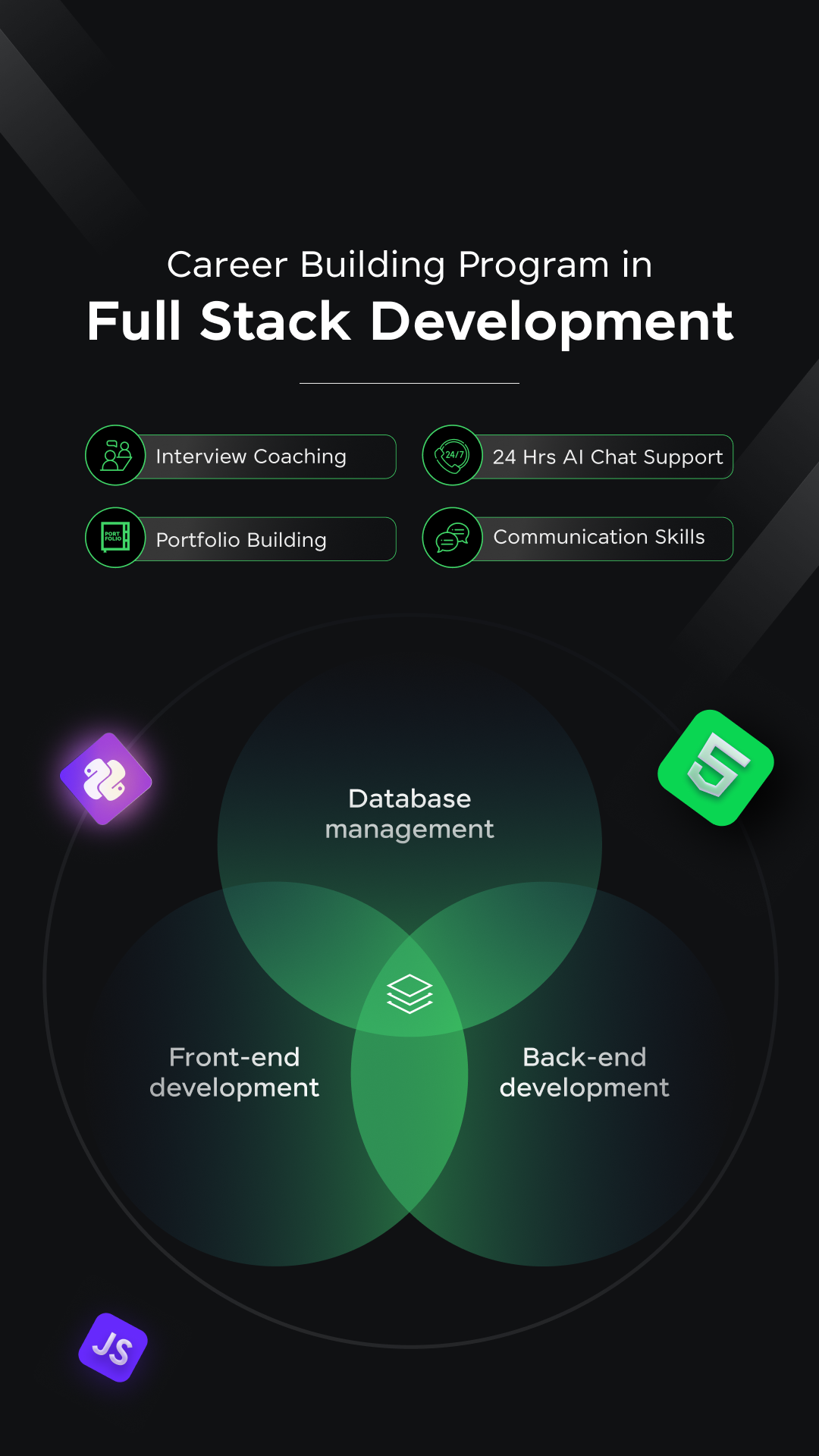
















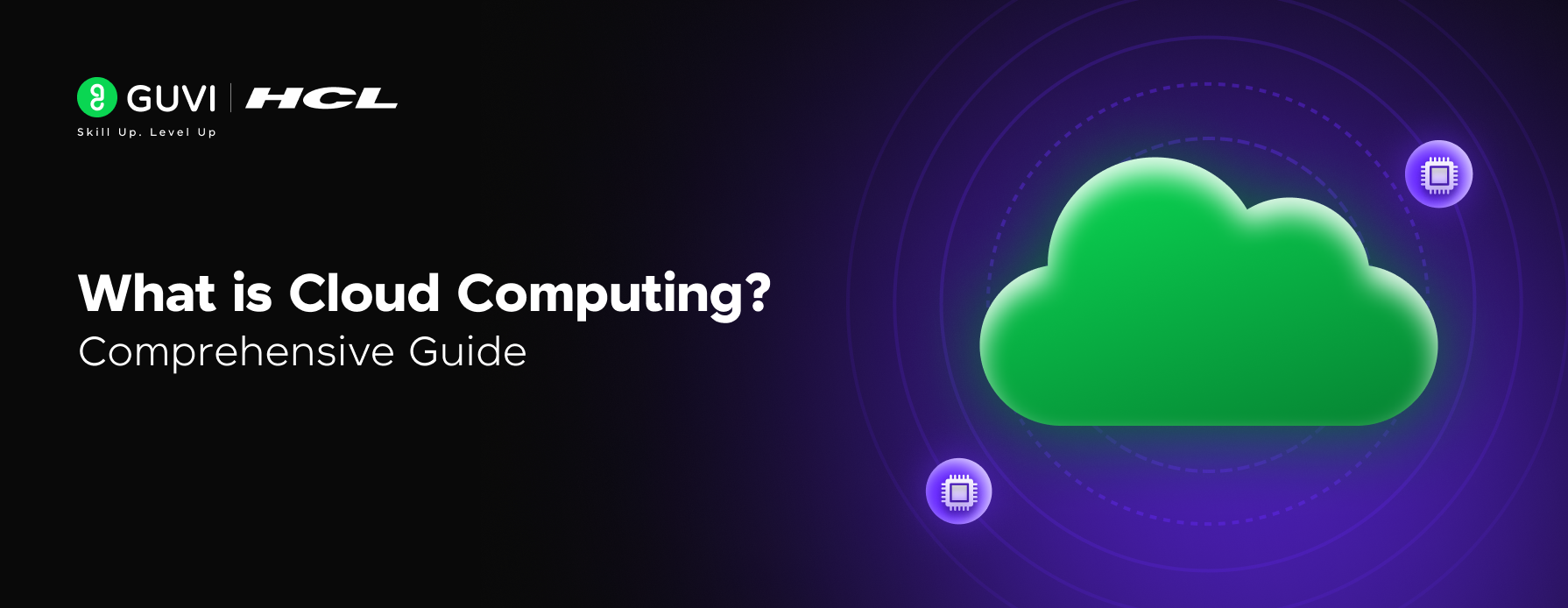
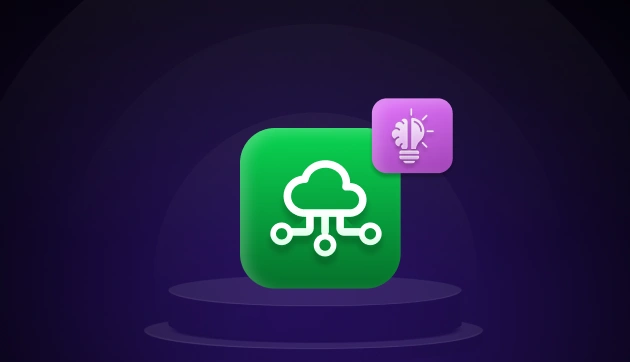

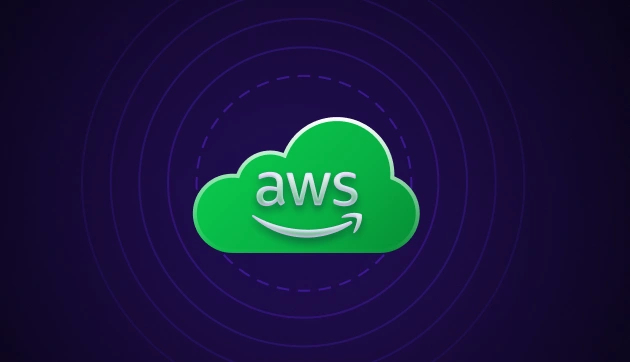

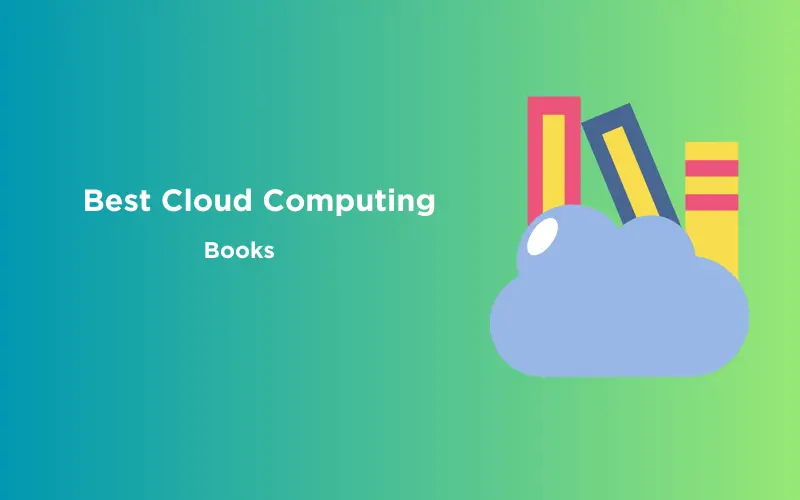

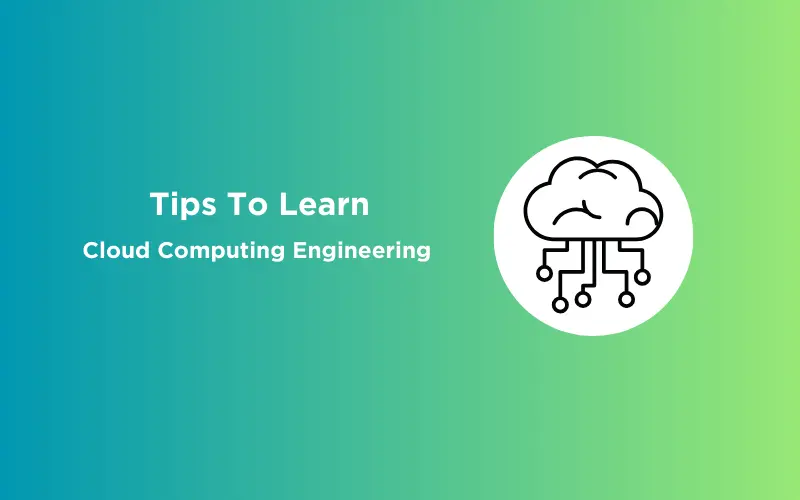


Did you enjoy this article?